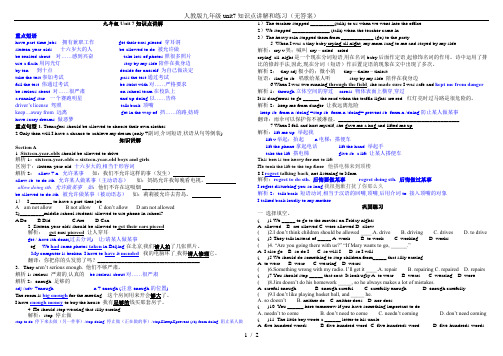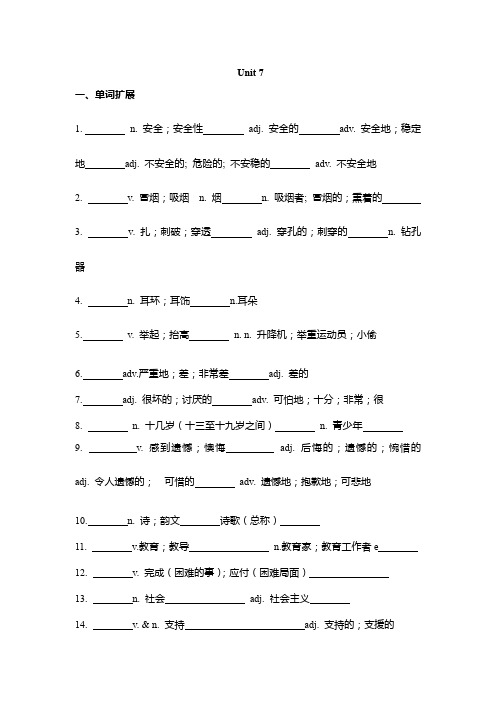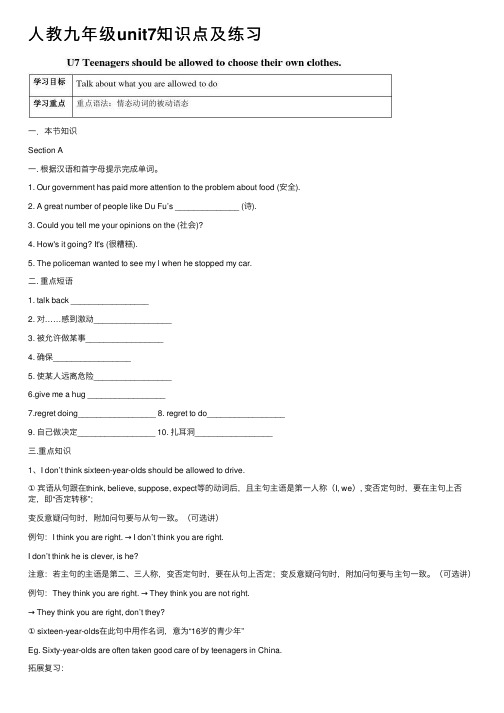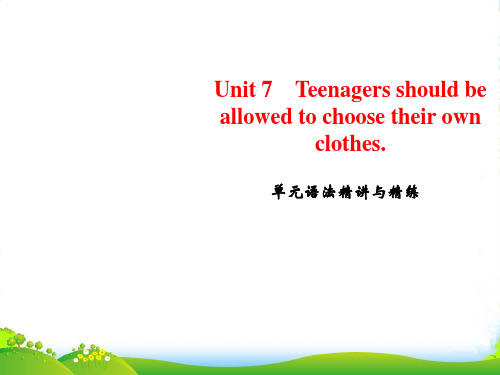英语人教版九年级全册Unit7 语法讲解及练习
人教版九年级全册英语Unit7 SectionB 知识讲解+专题练习学案(含答案)

Unit7 SectionB知识讲解1. get in the way of挡……的路;妨碍by the way意为"顺便说一下";in a way意为"在某种程度上";on the/one’s way to...意为"在去……的路上";in this way意为"这样,以这种方式"。
2 We have nothing against running! 我们不反对跑步!(1)have nothing against (doing) sth. 意为"不反对(做)某事"。
(2)against介词,意为"反对;违背",其反义词为for,意为"支持"。
3 happen 不及物动词,意为"发生"。
(1)"Sth.+happened+地点/时间"意为"某地/某时发生了某事"。
(2)"Sth. + happened to sb."意为"某人出了某事(常指不好的事情)"。
(3)"Sb.+ happened to do sth."意为"某人碰巧做了某事"。
(4)"It happened + that从句"意为"碰巧……"。
4 choice 选择;抉择(1)choice常用于短语have no choice but to do sth.,意为"除了做某事以外,别无选择"或"只好做某事"。
(2)choice的动词形式为choose, choose to do sth.意为"选择做某事"。
5 Only then will I have a chance to achieve my dream.只有那样我才有机会实现自己的梦想。
本句是一个倒装句,正常语序是I will have a chance to achieve my dream only then.。
当only位于句首,其后接副词、介词短语或状语从句时,句子或主句要用部分倒装结构,即把助动词、情态动词放在主语前。
如果only后跟的是主语,则不用倒装。
专题练习一、单项选择1.—Hi, Billy! How was your trip to Xi'an?—It was _____. I caught a bad cold as soon as I got there.A.wonderful B.awfulC.comfortable D.peaceful2.The story reminds us that we could never make a ______ if we can’t keep it.A.wish B.choice C.decision D.promise 3.—Do your hobbies ________ your schoolwork, Linda?—Yes, sometimes. I think I should learn to plan my time carefully.A.play a part in B.have to do with C.get in the way of D.take the place of 4.Seeing their teacher _______ into the classroom, they stopped _______ at once. A.walk; telling B.entering; to speak C.enter; to tell D.walking; talking 5.He rides a bike to work every day in order to keep in ________.A.support B.service C.shape D.surface二、完型填空A new law in New York allows people to bring their dogs to restaurants. Some people 6 eating with dogs is great. They argue that it's good for dogs. They say owners don't have to leave their pets home alone or in cars while they eat out. But some peopleare7 about eating next to dogs. They say dog hair can create unclean conditions. Also, dogs can annoy (烦扰) customers8 barking (吠叫) or making a mess.Should dogs be9 in restaurants? Here is what two students think.YES! As long as dogs are well-behaved (很乖的) and clean, there's no10 why they shouldn't be allowed in restaurants with their owners. When restaurants allow dogs, people can spend more time with their11 . That will make them both happier. If someone doesn't want to eat near dogs, they can eat in the indoor part of therestaurant.12 they can go to a restaurant that doesn't allow dogs.Victoria Gonzalez,North CarolinaNO! Dogs 13 be allowed in restaurants. They can cause health problems. Some people are allergic (过敏的) to dogs, so being around dogs could be14 for them. Also, some dogs could annoy customers by jumping on them or stealing their food. Some dogs might even hurt customers. If that15 , restaurants may end up losing customers and money.Josh Cramer,Wisconsin 6.A.hope B.think C.hear D.see 7.A.happy B.sure C.worried D.honest 8.A.by B.in C.on D.with 9.A.allowed B.eaten C.drawn D.hidden 10.A.time B.place C.problem D.reason11.A.kids B.pets C.customers D.parents 12.A.But B.If C.Or D.So 13.A.would B.wouldn't C.should D.shouldn't 14.A.safe B.easy C.dangerous D.difficult 15.A.happens B.remains C.fails D.stops16.According to the material, experts encourage students to _____.A.review the texts B.discuss with each otherC.answer questions actively D.explain things in their own words 17.Who would like to ask a classmate rather than a teacher?A.Eliza.B.Judy.C.Tara.D.Sam.18.In Ted's school, students aren't allowed to talk in _____ classes.A.science B.art C.Chinese D.music 19.How many students think talking in class is a good idea?A.Two.B.Three.C.Four.D.Five. 20.Where could we read this material?A.In a storybook.B.On the website.C.On a notice board.D.In a student's diary.四、用所给单词的正确形式填空21.We have nothing against ___________ (run).22.Though the work was difficult, we _________ (success) in finishing it.23.Our teachers and parents often tell us the __________ (important) of English.24.He needs _____________ (spend) more time on his homework because __________ (become) a professional sports star is a difficult dream.25.What ______________ (happen) if he doesn’t end up as a professional runner?五、完成句子26.不管我们有多少困难,我相信所有的难题到最后都可以解决。
人教版九年级unit7知识点讲解和练习(无答案)

九年级Unit 7知识点讲解重点短语have part-time jobs 拥有兼职工作get their ears pieced 穿耳洞sixteen-year-olds 十六岁大的人be allowed to do 被允许做be excited about 对……感到兴奋take lots of photos照很多照片use a flash用闪光灯stay by my side陪伴在我身边by ten 到十点decide for oneself 为自己做决定take the test参加考试pass the test通过考试fail the test 伟通过考试be strict with对……严格要求be serious about 对……很严肃on school team在校队上a running star 一个赛跑明星end up doing以……告终driver’s license 驾照talk back 顶嘴keep…away from 远离get in the way of 挡……的路,妨碍have scary dreams 做恶梦重点句型1. Teenagers should be allowed to choose their own clothes.2.Only then will I have a chance to achieve my dream.(only +副词,介词短语,状语从句等倒装)知识讲解Section A1. Sixteen-year-olds should be allowed to drive.解析1:sixteen-year-olds = sixteen-year-old boys and girls区别于:sixteen-year-old 十六岁大的,相当于形容词解析2:allow + n. 允许某事如:我们不允许这样的事(发生)allow sb. to do sth. 允许某人做某事(主动语态)如:妈妈允许我每晚看电视。
Unit7知识点解析与练习人教版九年级英语全册

Unit 7一、单词扩展1.n. 安全;安全性adj. 安全的adv. 安全地;稳定地adj. 不安全的; 危险的; 不安稳的adv. 不安全地2. v. 冒烟;吸烟n. 烟n. 吸烟者; 冒烟的;熏着的3. v. 扎;刺破;穿透adj. 穿孔的;刺穿的n. 钻孔器4. n. 耳环;耳饰n.耳朵5. v. 举起;抬高n. n. 升降机;举重运动员;小偷6. adv.严重地;差;非常差adj. 差的7. adj. 很坏的;讨厌的adv. 可怕地;十分;非常;很8. n. 十几岁(十三至十九岁之间)n. 青少年9. v. 感到遗憾;懊悔adj. 后悔的;遗憾的;惋惜的adj. 令人遗憾的;可惜的adv. 遗憾地;抱歉地;可悲地10. n. 诗;韵文诗歌(总称)11. v.教育;教导n.教育家;教育工作者e12. v. 完成(困难的事);应付(困难局面)13. n. 社会adj. 社会主义14. v. & n. 支持adj. 支持的;支援的15. v. 进来;进去n. 入口;进入16. n.选择;挑选答案1. safety n. 安全;安全性safe adj. 安全的safely adv. 安全地;稳定地unsafe adj. 不安全的; 危险的; 不安稳的unsafely adv. 不安全地3. pierce v. 扎;刺破;穿透pierced adj. 穿孔的;刺穿的piercer n. 钻孔器4. earring n. 耳环;耳饰ear n.耳朵5. lift /lIft/ v. 举起;抬高lifter n. n. 升降机;举重运动员;小偷6. badly adv.严重地;差;非常差bad adj. 差的7. awful adj. 很坏的;讨厌的awfully adv. 可怕地;十分;非常;很9. regret v. 感到遗憾;懊悔regretful adj. 后悔的;遗憾的;惋惜的regrettable adj. 令人遗憾的;可惜的regrettably adv. 遗憾地;抱歉地;可悲地14. support v. & n. 支持supporter n.支持者supportor n.支架supportive adj. 支持的;支援的二、知识点解析1 我认为2 get + sth. + 动词的过去分词意3 stop doing sth. 停止做某事stop doing sth. 与stop to do sth.4 wear(wore, worn)及物动词,意为"穿着;戴着",表示穿的状态wear, put on, dress, (be) in与have on5 bringbring, take与fetch/get6. regretregret doing sth. 与regret to do sth.7 allow /ələʊ/ v. 允许;准许be (not) allowed to do sth. (不)被允许做某事allow doing sth. 允许做某事8 safety /’seɪfti/ n. 安全;安全性safe adj. 安全的;无危险的;其反义词是dangerous adj.危险的。
人教九年级unit7知识点及练习

⼈教九年级unit7知识点及练习⼀.本节知识Section A⼀. 根据汉语和⾸字母提⽰完成单词。
1. Our government has paid more attention to the problem about food (安全).2. A great number of people like Du Fu’s ______________ (诗).3. Could you tell me your opinions on the (社会)?4. How's it going? It's (很糟糕).5. The policeman wanted to see my l when he stopped my car.⼆. 重点短语1. talk back _________________2. 对……感到激动_________________3. 被允许做某事_________________4. 确保_________________5. 使某⼈远离危险_________________6.give me a hug _________________7.regret doing_________________ 8. regret to do_________________9. ⾃⼰做决定_________________ 10. 扎⽿洞_________________三.重点知识1、I don’t think sixteen-year-olds should be allowed to drive.①宾语从句跟在think, believe, suppose, expect等的动词后,且主句主语是第⼀⼈称(I, we), 变否定句时,要在主句上否定,即“否定转移”;变反意疑问句时,附加问句要与从句⼀致。
(可选讲)例句:I think you are right. → I don’t think you are right.I don’t think he is clever, is he?注意:若主句的主语是第⼆、三⼈称,变否定句时,要在从句上否定;变反意疑问句时,附加问句要与主句⼀致。
人教九年级英语上册课件:Unit 7 单元语法精讲与精练(共11张PPT)

You made my day!
我们,还在路上……
3.主动语态变被动语态时的特殊情况 (1)含有双宾语的主动句变为被动句时,把代表人的间接宾语变为被动句的 主语,把直接宾语留为被动句的宾语;若把主动句的直接宾语变为被动句的 主语,间接宾语前须加介词 for 或 to。 My aunt gave me a book on my birthday. →I was given a book on my birthday by my aunt. → A book was given to me on my birthday by my aunt.
三、按要求完成句子,每空一词。 1.Nobody can answer the question.(同义句改写) The question __c_a_n_'_t__ __b_e_ answered by anybody. 2.We should clean our teeth twice a day.(改为被动语态) Our teeth should __b_e_ _c_le_a_n_e_d___ twice a day. 3.You can't lend the magazine to others.(改为被动语态) The book _c_a_n_'_t_ __b_e__ _l_e_n_t_ to others. 4.The lights should be turned off before you leave the classroom.(改为主动语 态) You _s_h_o_u_l_d__ _t_u_r_n__ off the lights before you leave the classroom.
B.can tell
Unit72d语法讲练九年级英语全册(人教版)

Read and ob带se有rve情th态e c动olo词re的d w被or动ds语an态d s结ent构enxteen-y情ear态- 动词I+agbreee+. TVh-eeydaren’t serious
2. These flowers are watered every two days. (改为否定句) These flowers aren’t watered every two days.
3. That film is liked by children. (改为一般疑问句并作肯定及 否定回答) — Is that film liked by children? — Yes, it is. / No, it isn’t.
Wu Lan: Oh, no. Mr. Smith says we must not take photos.
It’s not allowed in the museum.
照相
Sandy: That’s too bad! Do you think we may be allowed
那太糟糕了! to take photos if we don’t use a flash? be allow to do
wasn't invited to was invented
was taken
Let’s enjoy a video
1 Free talk
Do your parents allow you to watch TV at home? Yes, they do.
I think you may be allowed to watch TV on weekends. But you may not be allowed to watch TV on school days.
人教版英语九年级全册单元unit 7 知识点+测试卷+思维导图

Unit 7 Teenagers should be allowed to choose their own clothes.1.重点词汇:license, safety, field, hug, poem, community, chance, society, choice, smoke, cry, life, regret, manage, educate, enter, support...2. 短语归纳:1.get his driver’s license 取得他的驾驶执照2.no way没门,不行3.sixteen-year-olds 十六岁的人4. be worried about=worry about 担5. have part-time jobs 做兼职工作6. get one’s ears pierced 打耳洞7. get / have / make sth. done 使某物被做……8. stop doing sth 停止做某事9. stop to do sth. 停下来去做某事10. spend time with sb. 花时间和某人在一起11.take photos, take a photo 照相e a flash 使用闪光灯13.all night 整夜14.stay by my side 待在我身边15.make sure = be sure 确保,确定16.keep sb. (away) from sth使某人远离某物17. hurt oneself 伤害某人自己18. give sb. a hug = hug sb. 拥抱某人19.lift sb. up 举起某人20. cough badly 剧烈地咳嗽3. 必背典句:1.-I don’t think sixteen-year-olds should be allowed to drive. 我认为十六岁的孩子不应该被允许开车。
人教版九年级全一册英语Unit7单元语法知识点总结

人教版九年级全一册英语Unit7单元语法知识点总结本单元重点短语的具体用法1. get his driver’s license:取得驾驶执照。
例如:He finally got his driver's license after many attempts.(经过多次尝试,他终于拿到了驾驶执照。
)2. no way:没门,不行。
例如:- Can I have a day off?(我能请一天假吗?)- No way!(不行!)3. sixteen-year-olds:十六岁的人,是一个复数名词,表示十六岁的群体。
例如:Sixteen-year-olds are not allowed to vote in this country.(在这个国家,十六岁的人不被允许投票。
)而sixteen-year-old 则是一个形容词,用来修饰名词,表示“十六岁的”。
例如:He is a sixteen-year-old boy.(他是一个十六岁的男孩。
)4. be worried about = worry about:担心,担忧。
例如:Don't worry about the exam. You will do fine.(不要担心考试,你会做得很好的。
)或者She is worried about her son's health.(她担心她儿子的健康。
)5. have part-time jobs:做兼职工作。
例如:Many college students have part-time jobs to earn some extra money.(许多大学生做兼职工作来赚一些额外的钱。
)6. get one’s ears pierced:打耳洞。
例如:She wants to get her ears pierced, but her parents don't allow it.(她想打耳洞,但她的父母不允许。
- 1、下载文档前请自行甄别文档内容的完整性,平台不提供额外的编辑、内容补充、找答案等附加服务。
- 2、"仅部分预览"的文档,不可在线预览部分如存在完整性等问题,可反馈申请退款(可完整预览的文档不适用该条件!)。
- 3、如文档侵犯您的权益,请联系客服反馈,我们会尽快为您处理(人工客服工作时间:9:00-18:30)。
含情态动词的被动语态构成:
情态动词(can/may/must/should)+be+及物 动词过去分词 1、This bike can be repaired.
2、The old should be spoken to politely.
3、The classroom must be cleaned every day.
Many trees are planted on both sides of the road.
3. 邮票是用来寄信的。
Stamps are used for sending letters.
4. 工作什么时候完成的。
When was the work finished?
1. The car was stolen yesterday. 一般疑问句:
3、主动句的主语变为被动句的宾语,由by 引出, 当不强调动 作的执行者时,常省略。 e.g many people speak English.
English
is spoken
by many people.
一般现在时被动语态的构成: am/is/are+及物动词的过去分词
动词过去分词的构成规则(与动词过去式构成规 则一样):
1、一般在动词原形末尾加-ed,looked played 2、结尾是e的动词加-d , lived used 3、末尾只有一个辅音字母的重读闭音节词,先 双写 这个辅音字母,再加-ed, planned 4、结尾是“辅音字母+y”的动词,先变“y”为 “i” , 再加-ed , study---studied,carry--carried
Trains are made in Zhuzhou. 2.The farmers grow rice every year.
被动语态
主动语态
Rice is grown by the farmers every year. 被动语态
主动语态变被动语态的步骤: 1、主动语态的宾语变为被动语态的主语; 2、主动句的谓语动词变为被动结构;
Yao Ming
to
basketball in the USA.
4、Lu Xun wrote the book. The book by Lu Xun.
一般将来时被动语态的构成:
Will be + 及物动词的过去分词 e.g: 1. Many flowers will be planted next year. 2. This girl will be taken to a safe place. 3. A new park _______ in our hometown next year. (build)
把下列句子变成被动语态的句子;
1、They planted these trees on weekends .
These trees on weekends.
2、The workers built the bridge in 1968 built by the workers in 1968. 3、People invited Yao Ming to play basketball in The USA.
(
)3.---Where are bananas _______? ---- _____ grown in South China.
把下列主动句变被动句: 1、We should plant the trees around the lake. 2、We must repair the computer now .
3、Students should correct their mistakes .
4、We must water the trees well.
翻译下列句子: 1.去年这里种植橘子。
2. 他经常受到老师的帮助。
3. 昨天晚上他的家庭作业做完了。
4.应该好好照顾妇女和儿童。
5.前天他掉到河里,但被救了。
6. 他经常被看见在操场上打篮球。
7.刚才允许他们拍照。
ቤተ መጻሕፍቲ ባይዱ
1. 盐产在哪儿?
Where is salt produced?
2. 马路两边种了许多树。
否定句:
特殊疑问句: 2.Silk is produced in Suzhou. 一般疑问句: 否定句:
特殊疑问句:
三、单项选择题:
( )1. Sweaters are used _______ keeping us warm.
A.of ( B.by C.for D.in
)2.Are these fridges made______? A.in China C.of China B. in Chinese D.from Chinese
1、They speak English in Canada .(English….)
English is spoken in Canada.
2、People use wood for making tables. (wood….)
3、They make computers in the USA.(Computers…) 4、 They grow rice South (Rice…) Computers are in made inChina. the USA.
Wood is used for making tables.
Rice is grown in South China.
一般过去时被动语态的构成: was/were+及物动词的过去分词 e.g: 1、The bridge was built last year. 2、It was used in the old days. 3、The car was invented in 1885.
(The Passive Voice)
.主动语态与被动语态:
英语动词有两种语态,即主动语态(The Active Voice)与被动语态(The Passive Voice)。 主动语态表示主语是动作的执行者;被动语态表示 主语是动作的承受者。 主动语态 e.g. 1.They make trains in Zhuzhou .
